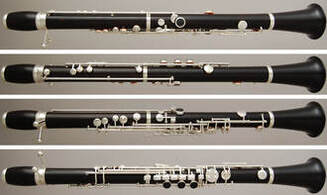 Peter Worrell's One-Handed Clarinet, winner of the 2017 OHMI Competition Peter Worrell's One-Handed Clarinet, winner of the 2017 OHMI Competition In my April post, I wrote about the impact of the coronavirus on my life and the music industry. 2020 has been a year of great upheaval. Though lockdown is easing in many parts of Britain, we now wait to see if, and when, the second wave of COVID will strike. I’m still job-hunting at a time when people are continuing to be laid off and, in journalism at least, jobs are becoming rarer. It may be necessary for me to freelance for a while, something new for me to consider. And perhaps self-employment will suit me well: the freedom to work in my own space; to my own schedule and write about the topics that really interest me all have their appeal. Until now, I’ve always considered a job to be synonymous with employment, so the possibility of freelancing is significant. However, there have been some minor changes in my life too. My little sister has dyed her hair “strawberry-and-cream” – the left half of her hair is a gentle pink while the right is bleach-blonde – and I’ve started up a new exercise regime. In the past, I’ve struggled to find a form of exercise I can do without encountering too many physical difficulties. Some sports (hockey, for example) require the use of two highly dexterous hands, others (gymnastics) demand a high level of balance – something I’ll never have. Some, I just find boring (running). One of the few types I do enjoy is dance, though some of the moves I’ve found very difficult. The online dance workout programme, Body Groove, is excellent because there is no hard and fast way to complete the steps. The instructor gives you a few simple moves, which can be adapted any way you want. You can make them complicated or straightforward, go backwards or forwards, it doesn’t matter. So, I’ve been able to modify the steps to fit my own ability. I mentioned previously (May, I think) that music is an adaptable art; an activity that can be explored and altered to fit anyone’s ability. As a result, it is open to so many different techniques, styles and instruments. Liz Eaton was once a violinist but found she was unable to play following a stroke 24 years ago. Determined to continue making music, she set off to find an instrument she could play. The list of instruments she tried is impressive, ranging from drums to keyboard to recorder. When I first asked what she played her answer was “well, that’s the question!” When Liz told me the list, my first thought was “gosh, that must be expensive?”, though she did say that it was not too money-draining. At the cheaper end of the spectrum, she said the cost was similar to a traditional instrument: “about £10 - £100”. However, she did point out that there are some instruments which you would need to be very sure about wanting to learn. The one-handed clarinet, made by instrument-maker Peter Worrell, costs £6,000. On the plus side, it is one of the best instruments in the world. (It is also a previous winner of the OHMI Competition which, of course, makes it even better!) Her struggles have not affected her outlook on music-making. In fact, she told me: “I like trying different instruments as a beginner. It might have made quite a difference if I could have had easy access to the hire of the one-handed instruments early on when I had the stroke. I remember playing the drum badly early on, possibly because my brain had lost its musical ability. It might have put me off musical instruments.” Liz’s experience has shown me that change can be exciting. Her stroke meant she started to try out new instruments and styles of music-making – something she may otherwise never have done. So, while I’m bored stiff of waiting in line outside my doctor’s surgery for half-an-hour just to pick up my prescription, I shall take this opportunity to think of new things to try. I may discover something I really enjoy! Comments are closed.
|
CategoriesArchives
June 2024
|

 RSS Feed
RSS Feed
